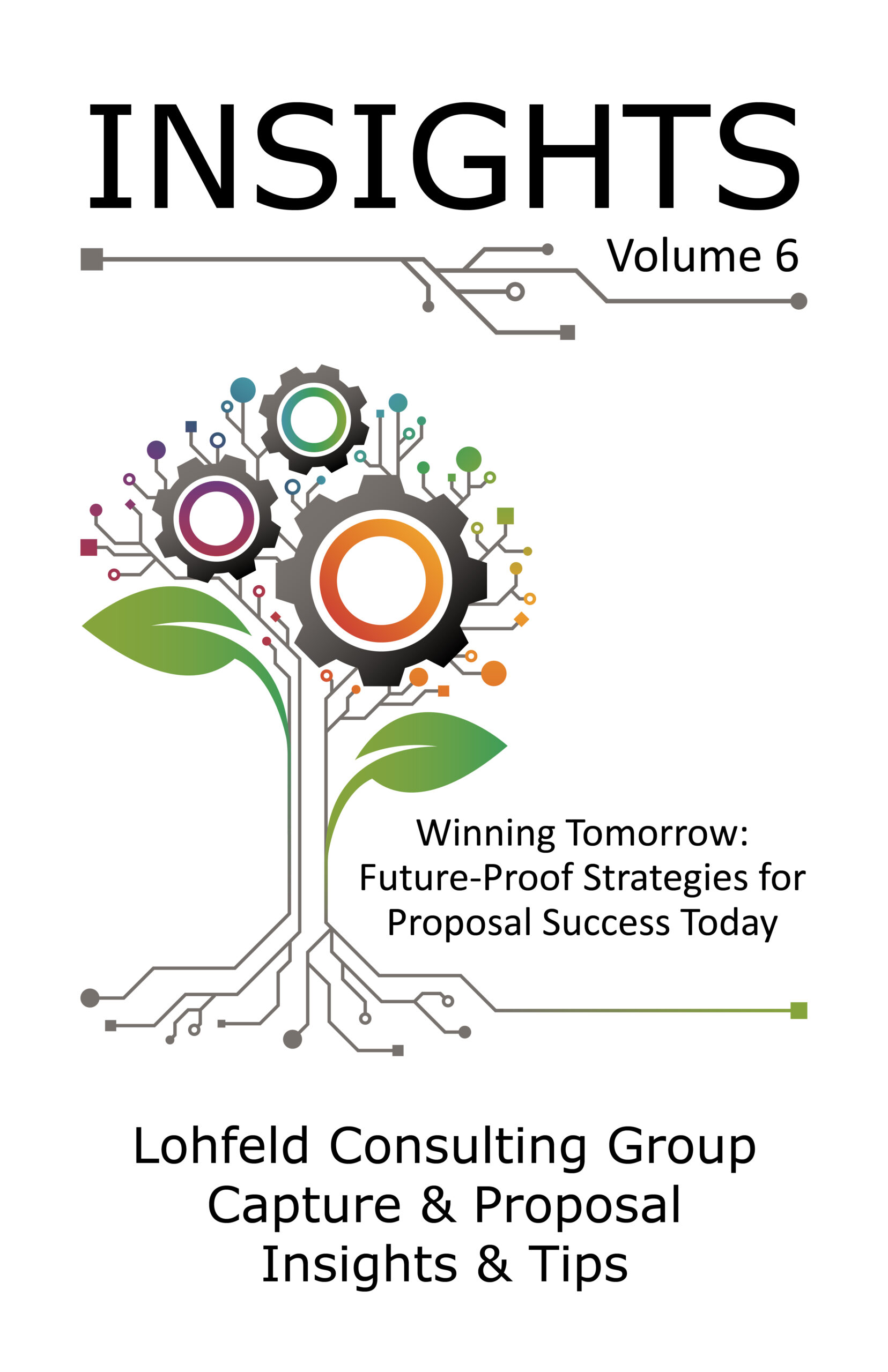50 Words and Phrases to Jumpstart GenAI Prompts

Introduction
As bid and proposal professionals, we understand the importance of crafting compelling and high-scoring content that wins contracts. Generating persuasive text can be challenging, but with the help of generative artificial intelligence (GenAI), you can streamline the process. Whether you’re looking to analyze, persuade, or summarize, specific prompts can help you harness GenAI’s potential.
50 Words and Phrases to Support Better AI Prompts
Table 1 offers a collection of 50 words and phrases to enrich your GenAI prompts, fostering brainstorming, innovation, and in-depth exploration of your proposed solutions. Consider amalgamating these words and weaving them together into a seamless chain of thought to achieve your desired outcome. To improve your results, provide background information, including solution descriptions, past performance, resumes, and customer intelligence.
Table 1: 50 Words and Phrases to Jumpstart GenAI Prompts
| No. | Words | GenAI Phrase |
| 1 | Analyze | “Analyze the request for proposal (RFP) requirements. Analyze the RFP for the customer’s top priorities, pain points, size, scope, complexity, and risks to operations. Analyze the evaluation criteria, terms, conditions, language, and tone.” |
| 2 | Argue | “Argue persuasively for the superiority of our solution.” |
| 3 | Assess | “Assess the potential risks associated with the RFP requirements.” |
| 4 | Brainstorm | “Brainstorm innovative approaches to the solution.” |
| 5 | Categorize | “Categorize the key features of the product offerings.” |
| 6 | Clarify | “Clarify the scope and objectives of this proposal.” |
| 7 | Compare | “Compare our staffing strategy to competitors in the market.” |
| 8 | Conclude | “Conclude by highlighting the unique value we bring to the customer.” |
| 9 | Contrast | “Contrast the benefits of the solution with those on the market.” |
| 10 | Convince | “Convince the client of the ROI they’ll gain.” |
| 11 | Create | “Create a compelling vision for the project’s success.” |
| 12 | Critique | “Critique potential drawbacks in the approach.” |
| 13 | Define | “Define the project scope, deliverables, and timeline.” |
| 14 | Demonstrate | “Demonstrate how our solution solves the client’s challenges.” |
| 15 | Describe | “Describe the key features and benefits of the offering.” |
| 16 | Detail | “Detail the implementation plan for project execution.” |
| 17 | Develop | “Develop a customized solution tailored to the client.” |
| 18 | Discuss | “Discuss the market trends driving the need for the solution.” |
| 19 | Draft | “Draft a comprehensive proposal for client review.” |
| 20 | Elaborate | “Elaborate on the innovative aspects of the approach.” |
| 21 | Estimate | “Estimate the cost and time required for project completion.” |
| 22 | Evaluate | “Evaluate the solution’s potential impact on the client’s business.” |
| 23 | Examine | “Examine the current challenges faced by the client.” |
| 24 | Explain | “Explain the technology stack and its advantages.” |
| 25 | Formulate | “Formulate a clear strategy for project implementation.” |
| 26 | Generate | “Generate ideas for optimizing project efficiency.” |
| 27 | Highlight | “Highlight our company’s strengths and competitive advantages.” |
| 28 | Identify | “Identify the key stakeholders involved in the project.” |
| 29 | Illustrate | “Illustrate past successes using our company’s past performance.” |
| 30 | Imagine | “Imagine the positive impact the solution will have.” |
| 31 | Indicate | “Indicate how the solution aligns with industry standards.” |
| 32 | Interpret | “Interpret market data to support our company’s proposal.” |
| 33 | Invent | “Invent innovative solutions to overcome client challenges.” |
| 34 | Justify | “Justify the staffing strategy based on value delivered.” |
| 35 | List | “List the key features that set us apart from competitors.” |
| 36 | Narrate | “Narrate the client’s journey from problem to solution.” |
| 37 | Outline | “Outline the project phases and milestones.” |
| 38 | Persuade | “Persuade the client of the long-term benefits of the solution.” |
| 39 | Predict | “Predict potential obstacles and mitigation strategies.” |
| 40 | Propose | “Propose a tailored solution to meet the client’s needs.” |
| 41 | Provide | “Provide evidence of our industry expertise and credibility.” |
| 42 | Rank | “Rank the advantages of our solution over competitors.” |
| 43 | Reflect | “Reflect on lessons learned from past projects.” |
| 44 | Review | “Review the key project risks and mitigation plans.” |
| 45 | Show | “Show how the solution aligns with the client’s vision.” |
| 46 | Suggest | “Suggest innovative features that can enhance the project.” |
| 47 | Summarize | “Summarize the key benefits in a concise manner.” |
| 48 | Synthesize | “Synthesize market research to inform the proposal.” |
| 49 | Translate | “Translate technical jargon into client-friendly language.” |
| 50 | Write | “Write a persuasive proposal that captivates the client, free of spelling and grammatical errors.” |
Summary
The key to unlocking the power of GenAI lies in crafting clear, concise prompts. These 50 words and phrases will be your cornerstone for formulating compelling GenAI prompts, enabling you to distinguish your company in the competitive bidding landscape. Next time you draft a proposal, remember to jumpstart your GenAI prompts with these compelling words and phrases.
By Brenda Crist, Vice President at Lohfeld Consulting Group, MPA, CPP APMP Fellow
Lohfeld Consulting Group has proven results specializing in helping companies create winning captures and proposals. As the premier capture and proposal services consulting firm focused exclusively on government markets, we provide expert assistance to government contractors in Capture Planning and Strategy, Proposal Management and Writing, Capture and Proposal Process and Infrastructure, and Training. In the last 3 years, we’ve supported over 550 proposals winning more than $170B for our clients—including the Top 10 government contractors. Lohfeld Consulting Group is your “go-to” capture and proposal source! Start winning by contacting us at www.lohfeldconsulting.com and join us on LinkedIn, Facebook, and Twitter.
Paperback or Kindle
10 steps to creating high-scoring proposals
by Bob Lohfeld
contributors Edited by Beth Wingate
Subscribe to our free ebrief
Teaming friends, frenemies, and enemies—12 tips to mitigate harmful effects
Did you know that contracting officers spend up to 20% of their time mitigating disputes between teaming partners? In an informal poll we conducted on LinkedIn last month, 40% of respondents classified their teaming partners as “frenemies” on their last bid.
Explore Further
- Advice (542)
- AI (32)
- APMP (18)
- Army MAPS Contracts (4)
- Business Development (303)
- Capture Management (273)
- Complex Technology Grants Services (26)
- Favorite Books (5)
- GenAI (5)
- Go-to-Market (28)
- Graphics (5)
- Lohfeld Books (2)
- NASA SEWP VI Contracts (2)
- Navy SeaPort-NxG Contracts (2)
- NIST MSE Grants (1)
- NIST NAPMP Grants (2)
- Past Performance (63)
- Post-submission Phase (14)
- Pre-RFP Preparation (272)
- Proposal Management (350)
- Proposal Production (81)
- Proposal Reviews (45)
- Proposal Writing (115)
- Pursuit Phase (111)
- Research Report (4)
- Resources (64)
- Tools & Tips (434)
- Training (13)
- Uncategorized (223)

Sign Up for INSIGHTS and Download your FREE book
We'd love to help you with your proposals. Enjoy our complimentary Lohfeld Consulting Group Capture & Proposal Insights & Tips book with your FREE subscription to our Insights Newsletter.
GET YOUR FREE BOOK



